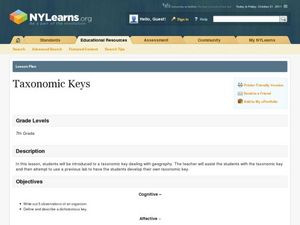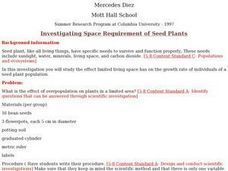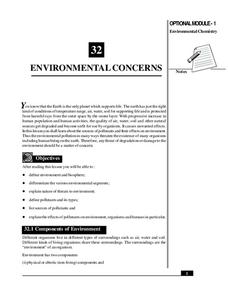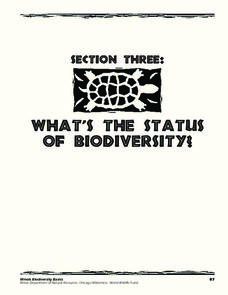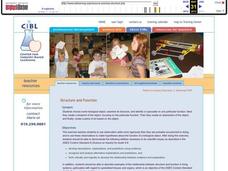Curated OER
Cell Works
Young scholars identify the different parts of the cells and their functions. In this biology lesson plan, students create an analogy of a cell and its organelles. They make a poster and present it to class.
Curated OER
Fun with Phylogenetic Trees
Tenth graders differentiate angiosperms and gymnosperms. In this biology lesson, 10th graders construct a musical phylogenetic tree from information they gathered on resource websites. They present their project in class.
Curated OER
Energy Content Of Foods And Fuels
High schoolers engage in a study of food and how it used as fuel for the human body. They research how biological systems require energy and compare them to the physical science systems like machines. They compare and contrast what they...
Curated OER
What's That? Diversity Among Organisms
Seventh graders can go outside and explore the organisms that live in the environment outside their door. This is a wonderful opportunity for students to examine the world around them with a new perspective. This activity will increase...
Curated OER
"Chips" Off the Old Block?
Students study using analogies between common items or occurrences and science concepts. They use the analogy of cookie recipes to that of the DNA "recipes" for living things to help us explain more about mutations.
Curated OER
Proteins Word Search Puzzle
In this biology worksheet, students look for the words in the puzzle that are related to the theme of the word search. Spelling skills are worked on.
Curated OER
Introduction to Simulation Project
Students create a simulated self-sustaining ecosystem. In this biology lesson, students examine the different food chain and ecosystems in their model. They recommend some improvements and changes to an existing ecosystem.
Curated OER
Taxonomic Keys
Seventh graders create their own dichotomous key. In this biology instructional activity, 7th graders classify animals based on their observable features. They explain how to use their dichotomous key.
Curated OER
DNA in the Garden - Families and Friends: Grouping and Sorting
In this grouping and sorting worksheet, students learn about sorting objects and living things into larger and smaller groups. They complete an exercise in which they sort cutlery, and then students answer the 3 questions on the page.
Curated OER
Classification
In this classification worksheet, learners will look at how biological classification began and how scientific names are used in biology. Students will use a table showing the classification of four organisms to answer 10 short answer...
Curated OER
Investigating Space Requirement of Seed Plants
Students use scientific methods to investigate the effects of overpopulation of seed plants on growth in a limited living space. Students relate seed plant population findings to that of other organisms.
National Institute of Open Schooling
Environmental Concerns
Every year, more than 14 billion pounds of garbage is dumped into the oceans of the world, most of which is plastic and toxic to ocean life. Lesson 32 in the series of 36 focuses on environmental concerns, specifically pollution. Under...
Nuffield Foundation
Microbes Ate My Homework
Now you have a new excuse not to do your homework. A long-term experiment has learners explore cellulose-digesting enzymes. They simulate how paper breaks down in a compost bin. There's no need to blame your dog for eating your homework...
Illinois Department of Natural Resources
Section Three: What's the Status of Biodiversity?
Biodiversity is essential for every habitat, but many species are at risk due to pollution and other factors. Explore several different species native to Illinois in a gallery walk with posters that learners have created after research...
Curated OER
What is Biology?
In this human needs worksheet, students review a graphic organizer explaining the basic human needs. Then students complete 1 true or false and 2 short answer questions.
Curated OER
Life at the Pond
Students identify the bugs collected from the pond. In this biology instructional activity, students observe the living and nonliving organisms in the pond environment. They write a reflection about why nature is important and must be...
Curated OER
Ecology
In this ecology learning exercise, students read information about ecology and the nine ecology subdivisions and answer comprehension questions. Students answer ten questions in this matching and fill in the blank learning exercise.
Curated OER
Now you see it....Now you Don't
Students investigate the biodegrading process of packing peanuts. In this biological process lesson, students conduct an experiment to see how quickly packing peanuts biodegrade. Students check the process each day and record their results.
Curated OER
Peter Rabbit Meets Charles Darwin
Students start to think of evolution in terms of populations. The class follows a cartoon scenario of a rabbit population in which there is selection and change of gene frequency. They receive copies of the scenario or the whole thing...
Curated OER
Structure and Function
Structure and Function
SynopsisStudents choose some biological object, examine its structure, and identify or speculate on one particular function. Next they create a blueprint of the object, focusing on the particular function. Then...
Curated OER
Make your Garden Grow
Fourth graders role play as certified horticulturists as they study the biology of plants and gardening. They design a garden for their school based on what they researched and a given budget.
Curated OER
Cycles of Life in an Urban Habitat: Changes in Biodiversity
Second graders compare and contrast animate and inanimate objects. For this environmental science lesson, 2nd graders create simple food webs. They observe their environment and create a collage about it.
Curated OER
Pair the Plants: An Introduction to Scientific Names
Students examine why plants have both common and scientific names, then complete the activity by matching each common plant name with its scientific name. They finish by working in cooperative groups to create an ABC of Plants class book.
Curated OER
In Their Own Words
Students watch a video of people telling about their experiences with a mental illness. They compare and contrast the life stories they saw to reinforce how mental illnesses are biological illnesses that affect a person's thoughts,...









